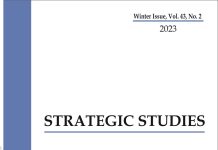Rajiv Dogra, Where Borders Bleed: An Insider’s Account of Indo-Pak Relations (Rupa Publications India Pvt. Ltd, 2015), 274.
Mahwish Hafeez
Where Borders Bleed:An Insider’s Account of Indo-Pak Relations by Rajiv Dogra is a book on the complex nature of India-Pakistan relations. The writer is a former Indian Foreign Service officer and has served in as Council-General at the Indian Consulate in Pakistan from 1992-1994 .While tracing the history, the writer shares his experiences and opinions about Pakistani politicians. In contrast to the Indian leaders, such as Gandhi, Nehru and Indira Gandhi, whom he sees as epitomes of integrity and honesty, he portrays Pakistani leaders otherwise. Since independence, the writer argues that the Indian leaders, especially Nehru, due to their idealism tried their best to maintain peaceful relations with Pakistan. He emphasizes that India, on numerous occasions, made huge concessions to Pakistan and argues that Pakistan ,after taking concessions from India, always found new means to undermine Indian interests.
In the initial chapters of the book, the writer narrates the events that led to the partition of Indian Sub–continent. The writer interprets the partition as a collaboration of Mohammad Ali Jinnah and the British Empire because, according to him, it served their purpose. For Jinnah, Pakistan was an ultimate ambition. Whereas, by encouraging and facilitating the division, the British had hoped that Pakistan, being an Islamic country, would play an instrumental role in bringing the Muslim countries closer to the West, at the same time, keeping India in check. He blames the British for their haste in accepting the partition plan because, in all probability, they knew that Jinnah’s health would not permit delay. This makes one wonder if history can be written without popular support













